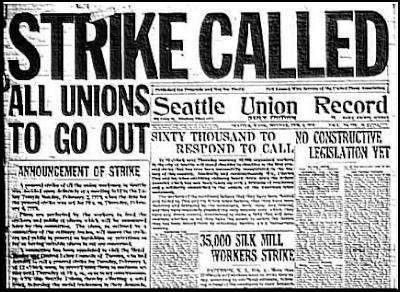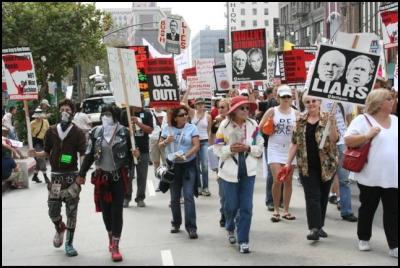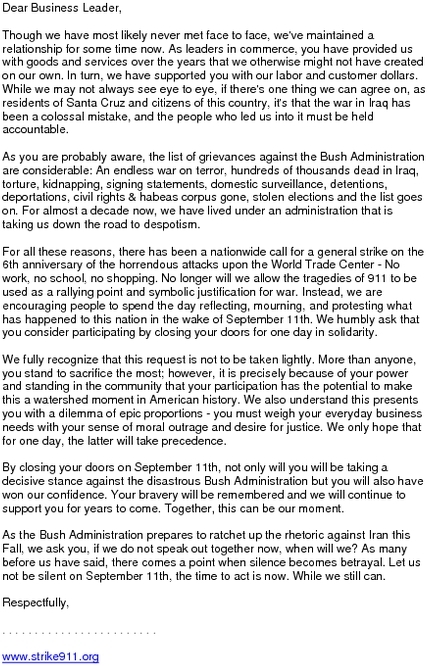A general strike is proposed for the United States on September11,
2007, the sixth anniversary of the 9/11/2001 attacks on New York City
and Arlington, Virginia. The general strike movement has no clearly
named leadership. It’s described as an Internet viral effort.
Wikipedia defines viral efforts on the Internet as:
An object (or an idea) is viral when it has the ability to spread
copies of itself or change other similar objects to become more like
(it) when those objects are simply exposed to the viral object.
General strikes, more common in Europe, are events that shut down
the normal operations of a city, state, or nation for a period of time.
These strikes aim to force awareness and action on a single issue or
broader set of concerns. The 9/11/07 General Strike has a central
location -
http://www.strike911.org/ - on the Internet, which is linked to and
reproduced on a variety of other internet sites. The site states the
rationale for the effort:
The General Strike is a national call to action, from citizens
to other citizens. It is not about a single issue. It is not an
anti-war protest, a civil rights protest, an election fraud protest.
It is not about torture, surveillance, corporate media, the 9/11
coverup, or the environment. This strike is about all these issues and
more.
We all have different concerns, but we all have the same
concern: we are being lied to and this government does not represent
us. Join other Americans in demanding truth, justice, and
accountability.
This is our country.
And our world.
We just have to stand up.
A National Call to Action: Tuesday, September 11th, 2007
No school. No work. Buy nothing. Hit the streets
(Click “ABOUT”)
LOCK DOWN USA – NO Answers (to anything)
The strike targets key issues facing the American public, issues
that have not been addressed in any meaningful way by any branch of
government. These include enduring questions and inconsistencies about
911, the Iraq War; violations of civil rights; and election fraud. As
the statement above indicates, one key means of the coverup is
the corporate media.
Citizen discontent with 911 has been expressed in a number of
public opinion polls. One of the most shocking surveyed citizens of New
York City. The little reported August, 2004
Zogby Poll found
that “Half of New Yorkers Believe US Leaders Had Foreknowledge of
Impending 9-11 Attacks and “Consciously Failed.” National surveys also
show substantial skepticism about the efforts of “US Leaders.”
Other concerns of the strike include areas of strong public
skepticism. As of August, 2007, 64% of
Americans
oppose the Iraq War and a majority says it should never have
happened in the first place. Massive violations of civil rights are
occurring with the aid of the U.S. Department of Justice, as reported by
its former voting rights head. Confidence in the legitimacy of the Bush
government has been voiced in polls in
Pennsylvania and in a
national sample of registered voters. Both Zogby polls showed that
tens of millions of Americans have little faith in the fairness and
results of the 2004 presidential election.
Reflecting the disquiet of the American public, Bush popularity is
in free fall. As low as
26% approval in recent polls, his decline has been steady and
unending since the peak after the 9/11 attacks (with an odd spike on
Election Day 2004).
The strike campaign argues that these and other issues rarely
covered in any depth by nearly all of the corporate media leave only one
move for citizens - a general strike to protest the policies plus the
lack of recognition and response.
Call to action: We just have to stand up
Standing up includes no work or school on September 11, 2007. It
also includes “no shopping;” a suspension of all purchasing during the
strike. One strike web site claims that this can have a substantial
impact even with just a small percentage of the population
participating.
The general strike calls for participants to “Hit the Streets.”
Significant activity is expected to focus on New York and Washington, DC
but, in the viral spirit, the venues of protest can’t be predicted.
General Strikes in the United States

Seattle
General Strike Project
The Seattle general strike of 1919 is the first known city-wide
general strike in U.S. history. Failing to get promised wage increases,
35,000 ship yard workers were joined by 25,000 other Seattle union
members for a 6 day work stoppage. The 60,000 workers and their families
represented a huge portion of Seattle’s 315,000 populations at the time.
The most recent U.S. general strike occurred on May 1, 2006 when
millions of Latinos hit the streets across the country. The Latino
population once, known as the sleeping giant of American politics, awoke
that day in a national effort that shocked and awed the U.S.
political elite. Millions protested proposed immigration laws that would
made a felon out of anyone claimed to have assisted undocumented workers
and broader social justice issues. The May Day demonstrations, in effect
a general strike, were preceded by a series of protests beginning in
March 2006.

Click for big version

This is the type of coalition that may produce major
results for the 9/11/07 General Strike. The March 2006 Los Angeles
protest saw 500,000 Angelinos join together. It was a predictor of the
May Day millions across the nation. It included a majority of Latino
civil rights advocates along with anti-Bush and antiwar participants.
Image: Michael Sedano (with permission)
Saturday, March 25, 2006, I joined 499,999--heck, maybe there were
a million of us-- other gente in the area around Los Angeles' City
Hall. Our massive reaffirmation of the US Constitution was one of many
such manifestations of community, and concern that the nation's
growing repression of people like us requires critical attention.
Half Million
Immigrant Readers, Voters, Mass in LA Michael Sedano, La Bloga
March, 2006
Possible Origins
While viral in nature at this point, recent history may
result in a broad based coalition. The pervasive motivation is the clear
indifference to pressing issues by all three branches of the federal
government. The White House stalled the 911 investigation and then
crippled the 911 Commission in many ways, including delay followed by
insufficient funds and authority. The Supreme Court of the U.S. recently
overturned landmark civil right legislation thanks to two newly
appointed justices who convinced key Senators that they would not
overturn civil rights protections. The new Democratic Congress of 2006
has failed to pass a meaningful resolution to end the Iraq War.
Specific recent political actions may well have contributed to the
general strike. They reflect the joining of antiwar, 911 Truth, and
impeachment groups.
- On June 27, 2007, the
United States
Social Forum, a convention of various social justice groups,
passed a
resolution that called for both the reopening of the 911
investigation and the impeachment of Bush and Cheney. This cooperative
effort by the 911 Truth movement, impeachment organizations, and the
anti war coalition is a new trend.
- On July 4, 2007, the Philadelphia Emergency Anti War Convention
convened in Pennsylvania. Cindy Sheehan pointed out that her audiences
have been filled with 911 Truth members who deserved answers to their
questions. The convention produced a strong set of demands known as
The Act
Independent United Front Program. The program calls for
impeachment of Bush, Cheney and associates; an end to all wars;
restoration of Constitutional Rights; an end to “Bush police-state
dictatorship;” a government by and for the people; and 9/11 truth –
reopening the investigation and full release of all 9/11
documentation.
Should this effort achieve momentum and see hundreds of thousands,
perhaps millions, “hit the streets,” politicians will be faced with a
real dilemma. They can continue to ignore, delay and dissemble, reaping
the consequences in 2008. Or they can act promptly and effectively to
satisfy the demands of the American public.






